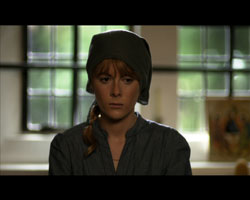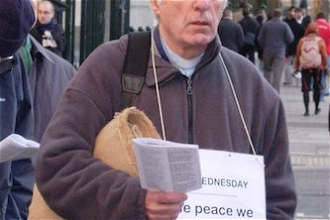The Calling

Brenda Blethyn plays Joanna
The Calling is a small-budget British film, directed by Jan Dunn, that will probably not be distributed or seen widely. However, with its Catholic themes and the treatment, it comes within the range of a SIGNIS Statement.
The film is about a community of Benedictine Nuns in Kent, England, and a young woman who feels she has a calling to the contemplative religious life. What promises to be an interesting portrait of an enclosed community is not. (A helpful comparison is Michael Whyte's 2009 documentary on the Carmelite Sisters of Notting Hill, London, No Greater Love.)
Diocesan Offices may be getting calls from those who want to complain about The Calling or from those who are asking for some explanations. Those who complain certainly have grounds for this. For audiences willing to give the film a go, they will probably be quite irritated and words like 'absurd', 'preposterous' and, at times, 'idiotic' may spring to mind.
The actual Benedictine Abbey of Minster in Kent provided help for the film and some groundwork for the plot. However, a glance at the Abbey's website shows how different the reality is from the melodramatics of the screenplay. Not that the screenplay is necessarily written in bad faith, though there are some shots at Vatican documents and official Catholic teaching on sexual issues (though Sister Ignatious (I'm afraid that's the way it is spelt for the film but this statement will take the liberty of writing the name correctly) makes the distinction necessary in speaking about abortion. She is anti-abortion but pro-choice at a crucial dramatic stage of the film; for her pro choice is, in essence, is a legal consideration rather than a moral one, a legal consideration for something which one does not approve, like St Augustine's supporting the legalisation of prostitution for the protection of the women and to try to preclude criminal elements exploiting the women, while he did not approve of it morally.) This is, in fact, a current issue for nuns in contemporary US health care discussions which may have influenced Jan Dunn in including it and discussion about contraception and the use of condoms in Africa.
One of the difficulties with the screenplay is the frequent use of the word, 'calling'. Catholics do not normally use that word. They use 'vocation' - and, in fact, this is the word used on the Minster Abbey website. This means that from the word go, or from the first use of the word 'calling', the film does not sound Catholic. Some of the ecclesiastical buildings look Anglican and the soundtrack chant is sung by the Canterbury Cathedral choir.
While important issues are interestingly dramatised, usually, they are outside the abbey of St Bertha (St Bertha!!!): the hostility of the mother of the young woman (Joanna/ Emily Beechum), her best friend's carping, ridiculing and offering advice whereas she is more concerned about herself than wanting Joanna to be happy and have her own peace of mind. The local parish priest is common-sensed and kindly. Psychological concern is rightly raised.
However, inside the abbey!
I suppose there are priests like Fr Kieren, the chaplain, a rather younger, self-righteous imperiously critical man. Yes, there are. However, by the end, he has a list of sins that have been exaggerated for plotline (and not every effectively).
The nuns are really a strange lot. Since they are Benedictines, in real life, the local bishop might have intervened more quickly (though he is not without skeletons in his cupboard, piling on screenplay exploitation and exaggeration). The Abbey would belong to the worldwide Benedictine Union and there would have been visitation and intervention long since. These sisters have a correct autonomy but locally are a law unto themselves.
Susannah York plays the prioress with huge emotional, psychological and vocational problems, ruling her small roost like someone who would have been rejected from The Nun's Story and who makes Meryl Streep's Sister Aloysius in Doubt, seem severe but normal. Her fate at the end is tragic but incredible.
Rita Tushingham and Pauline McLynn (who knows a thing or two about religious houses since she played Fr Ted's housekeeper on television) are two of the cattiest nuns you would wish not to meet, trying to drive Joanna out of the community. There is a sister who has been the victim of trauma and does not speak (but plays the organ beautifully) and there is a novice who has a dubious past and a dubious present.
All in all, a dysfunctional lot who remind us of the classic film of a dysfunctional community of nuns, Michael Powell's 1947 Black Narcissus, the story of an Anglican community in India after the war.
Which leaves Brenda Blethyn's Sister Ignatious (Ignatius). She is the contact with the outside and deals with Fr Kieren, interviews Joanna and befriends her and is the novice mistress. Though at one stage, she goes quite out of character and upbraids Joanna for her vegetarian choices and calls on obedience for her to eat the meat before her. That seems quite out of keeping with Sister Ignatius who is reported to have joined pro-choice protests, can make a sly remark about the Vatican, and has her own past secrets.
By this stage, Catholic audiences may be wringing their hands or planning a letter to the editor. Audiences who are hostile to the Church will feel that all their suspicions have been justified (and some!).
As with so many films which deal with the Catholic church in some detail, there has not been nearly enough seeking of technical advice to make it plausible if not accurate - or, if sought, not understood or not heeded. The screenplay's idea of a postulancy, a novitiate and the nature of vows is not well-informed and details are not correct, making it all seem more unnuanced and severe than it really is. (The nuns of Minster do have details of their postulancy and novitiate on the website.)
For those who have some experience of religious life, some of the hymns and canticles chanted in the chapel are not apt, though some scenes like that of communion or someone reading Catholic Life with Cardinal Murphy O'Connor on the cover are pleasingly real.


















